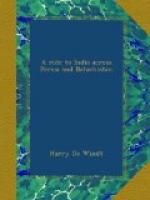[Footnote A: The word Demavend signifies literally “abundance of mist,” so called from the summit of this mountain being continually wreathed in clouds.]
[Footnote B: A pipe similar to the Turkish “hubble-bubble,” wherein the tobacco is inhaled through plain or rose water.]
[Footnote C: Harem.]
[Footnote D: A badge of royalty in Persia.]
[Footnote E: A stringed instrument played in the same way as the European guitar.]
CHAPTER VI.
TEHERAN—ISPAHAN.
We are already some farsakhs [A] from Teheran when day breaks on the 4th of February, 1889. The start is not a propitious one. Hardly have we cleared the Ispahan gate than down comes the Shagird’s horse as if he were shot, breaking his girths and rider’s thumb at the same moment. Luckily, we are provided with rope, and Persian saddles are not complicated. In ten minutes we are off again; but it is terribly hard going, and all one can do to keep the horses on their legs. Towards midday the sun slightly thaws the surface of the frozen snow, and makes matters still worse. Up till now the pace has not been exhilarating. Two or three miles an hour at most. It will take some time to reach India at this rate!
Four or five hours of this work, and there is no longer a sign of life to be seen on the white waste, saving, about a mile ahead of us, a thin wreath of grey smoke and half a dozen blackened tents—an encampment of gypsies. Far behind us the tallest minarets of the capital are dipping below the horizon, while to the left the white and glittering cone of Demavend stands boldly out from a background of deep cloudless blue. Though the sun is powerful—so much so, indeed, that face and hands are already swollen and blistered—the cold in the shade is intense. A keen, cutting north-easter sweeps across the white waste, and, riding for a time under the shadow of a low ridge of snow, I find my cigar frozen to my lips—nor can I remove it without painfully tearing the skin. Gerome is in his element, and, as a natural consequence, my spirits fall as his rise. The slowness of our progress, and constant stumbling of my pony, do not improve the temper, and I am forced at last to beg my faithful follower to desist, for a time at least, from a vocal rendering of “La Mascotte” which has been going on unceasingly since we left Teheran. He obeys, but (unabashed) proceeds to carry on a long conversation with himself in the Tartar language, with which I am, perhaps happily, unacquainted. Truly he is a man of unfailing resource!




